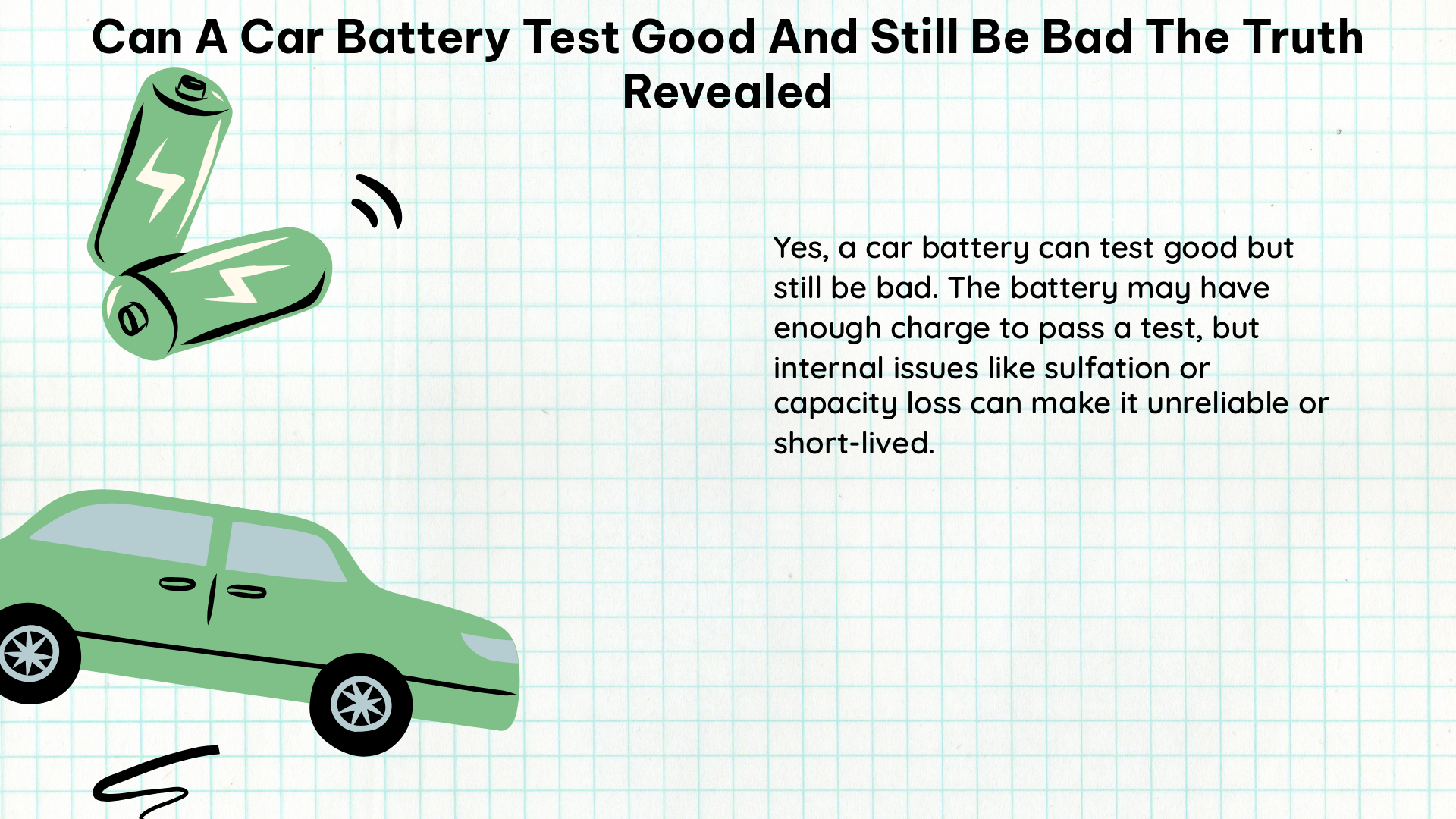Summary
The question of whether a car battery can test good and still be bad is a common concern among vehicle owners. The answer lies in understanding the various factors that can affect a battery’s condition, including the type of battery tester used, the parameters and thresholds applied, and the battery’s capacity and performance characteristics. This comprehensive guide will delve into the technical details and provide a hands-on, DIY-friendly approach to understanding the truth behind this phenomenon.
Understanding Battery Testers

Conductance Testers vs. Load Testers
Car battery testers can be broadly classified into two categories: conductance testers and load testers.
Conductance Testers:
– Simpler to use and interpret
– Can give false positives due to their limited testing capabilities
– Measure the battery’s ability to conduct current, which is related to its state of charge and overall condition
Load Testers:
– More straightforward in design
– Require the user to have a better understanding of how to interpret the results
– Measure the battery’s ability to deliver a specific amount of current under load, which provides a more comprehensive assessment of its condition
Both types of testers require the battery to be fully charged to obtain an accurate reading, which can take a few hours.
Interpreting Battery Test Results
Battery condition is not always a binary “good” or “bad” scenario. A battery can be in a “marginal” state, meaning it may pass or fail a test depending on the specific parameters and thresholds being applied. Therefore, it is crucial to ask for the detailed report from the battery tester, rather than simply asking if the battery is good or bad.
Quantifying Battery Performance
Capacity and Performance Tests
The capacity and performance characteristics of batteries can be quantified through regular performance tests, typically conducted every 1,500 to 2,000 miles of driving and charging. This is particularly important for plug-in electric vehicles, as their batteries must maintain excellent real-world performance to achieve widespread market adoption.
These performance tests can provide valuable insights into the battery’s state of health, including:
– Capacity (in Ah or kWh)
– Internal resistance
– Charge and discharge rates
– Efficiency
– Degradation over time
By monitoring these parameters, vehicle owners and technicians can better understand the battery’s condition and make informed decisions about maintenance or replacement.
Understanding Battery State-of-Charge (SoC) and State-of-Health (SoH)
The state-of-charge (SoC) and state-of-health (SoH) of a battery are critical factors in determining its overall condition.
State-of-Charge (SoC):
– Represents the amount of charge currently stored in the battery
– Can be monitored by tracking the battery’s charge level
– Expressed as a percentage of the battery’s full capacity
State-of-Health (SoH):
– Represents the ratio of the battery’s maximum charge capacity to its rated capacity
– Expressed as a percentage
– Indicates the overall condition and degradation of the battery
– Affects the battery’s discharge profile, with a lower SoH resulting in faster discharge
By understanding the SoC and SoH of a battery, vehicle owners and technicians can better assess its condition and make informed decisions about its maintenance or replacement.
Factors That Can Cause a “Good” Battery to Fail
Even if a battery tests “good” on a battery tester, there are several factors that can contribute to it still being in a poor condition:
- Sulfation: Over time, lead-acid batteries can develop a buildup of lead sulfate crystals on the battery plates, which can reduce the battery’s capacity and performance.
- Stratification: The electrolyte in a lead-acid battery can become unevenly distributed, with the denser, more concentrated acid settling at the bottom of the battery. This can lead to uneven charging and discharging, reducing the battery’s overall performance.
- Overcharging: Excessive charging can cause the battery to overheat and lead to the loss of electrolyte, which can damage the battery’s internal components.
- Undercharging: Insufficient charging can prevent the battery from reaching its full state of charge, leading to a gradual loss of capacity over time.
- Extreme Temperatures: Exposure to very high or low temperatures can accelerate the battery’s degradation and reduce its overall lifespan.
- Age and Usage: As a battery ages and is used, its internal components naturally degrade, leading to a gradual decline in its performance and capacity.
Conclusion
In conclusion, a car battery can indeed test “good” on a battery tester and still be in a poor condition due to a variety of factors. Understanding the different types of battery testers, the importance of interpreting the detailed test results, and the critical factors that affect a battery’s state-of-charge and state-of-health are essential for accurately assessing a battery’s condition.
By following the guidelines and technical details provided in this comprehensive guide, vehicle owners and technicians can make more informed decisions about their car batteries, ensuring they are properly maintained and replaced when necessary.
References:
- How accurate is the battery tester at Autozone and O’reilly’s? – Reddit. (2023). Retrieved from https://www.reddit.com/r/AskMechanics/comments/16fa9ip/how_accurate_is_the_battery_tester_at_autozone/
- AVTA – Battery Testing Data | Department of Energy. (n.d.). Retrieved from https://www.energy.gov/eere/vehicles/avta-battery-testing-data
- Please educate me on car battery testing | The Garage Journal. (2022). Retrieved from https://www.garagejournal.com/forum/threads/please-educate-me-on-car-battery-testing.504845/
- What are SOC and SOH of a battery, how to measure them? – BioLogic. (2023). Retrieved from https://www.biologic.net/topics/battery-states-state-of-charge-soc-state-of-health-soh/

The lambdageeks.com Core SME Team is a group of experienced subject matter experts from diverse scientific and technical fields including Physics, Chemistry, Technology,Electronics & Electrical Engineering, Automotive, Mechanical Engineering. Our team collaborates to create high-quality, well-researched articles on a wide range of science and technology topics for the lambdageeks.com website.
All Our Senior SME are having more than 7 Years of experience in the respective fields . They are either Working Industry Professionals or assocaited With different Universities. Refer Our Authors Page to get to know About our Core SMEs.